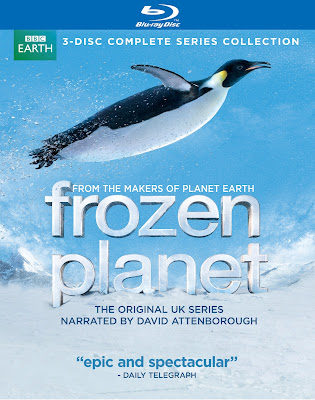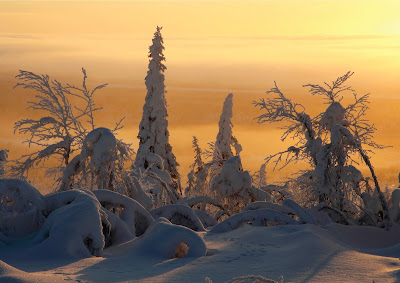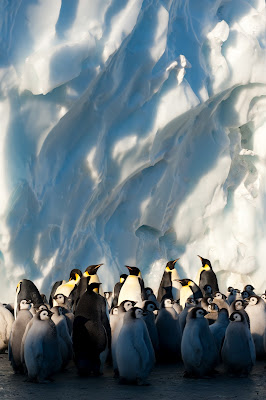
Whenever BBC Earth debuts a new miniseries it is definitely an event starting with Planet Earth

The DVD package spreads the seven episodes across three disks with a couple of special features. There is a twenty minute featurette about the scientific exploration at the South Pole. Yes there is a fully insolated science station at the most Southern point of the planet, watching the feature makes me want to find a way to get to visit there. The producers of Frozen Planets are hosting a contest, though not to the South Pole but a six day, five night trip to Manitoba to visit the polar bears of Churchill. Head over to frozenplanetdvd.com to enter. Other special features include a set of forty-seven production video diaries from those that made Frozen Planet that range from one to four minutes. There is also a special episode of Frozen Planet entitled The Epic Journey that is basically a greatest hits version of the seven episodes.

The bulk of the miniseries is dedicated to the four seasons with spring, summer, autumn, and winter getting their own episode. The viewers will get a heavy dose of how polar bears and penguins adapt to the season during these episodes (yes, there is some overlap from the March of the Penguins documentary but Frozen Planet goes into much deeper detail into the year in the life of the animal than the movie) with cameos from other cold weather inhabitants including bison, wolves, whales, seals (there is very graphic love making scene which unfortunately I cannot un-see) and many other. We even meet a caterpillar that actually freezes every winter for over a decade before it transform into a moth.

It is rare to see any human beings in any of these series from BBC Earth, but mankind actually gets its own episode with the episode The Last Frontier that travels to the northern most points of humanity to see how people have adapted in such cold places as Siberia and Alaska as well following the steps of the first explorers they tried to be the first to either Pole. There is even a segment on just how far some Inuit will go to get food including scaling down the side of the mountain with nothing but a rope to collect eggs.

Fox New watchers may not want to put in the third disk because the only episode on it is the final one On Thin Ice which looks at how global warming is affecting both ends of the Earth. It show just how a couple degrees is affecting how much ice covers the poles and how the freshwater ice caps are falling into the ocean at a quicker rate (with the 100th anniversary of the Titanic sinking a couple days ago, you will also get to see how icebergs are created). It is also show how the humans that live in the northern points of the Earth are dealing with the warming weather as well as animals at both ends are adapting.

As would expect based on previous series, Frozen Planet is a visual masterpiece with amazon shots that are even breathtaking in the DVD version (though if you do have a blu-ray player, I would recommend you spend the couple extra dollars to get the high definition version if the visuals are as stunning as they were on Life). This DVD set is based on the version of the series that aired BBC and is narrated by David Attenborough so fans of the version currently airing on Discovery with Adam Baldwin will probably have to wait a couple months for that to come out. But for those not a fan of anyone narrating and just want to take in the beautiful images without comment, you have the option to watch it with just the musical score. Personally I cannot wait to see what the team at BBC Earth has in store for us next, presumably in 2015.
Full Disclosure Notice: This series was given to me by BBC for the purpose of reviewing it.
No comments:
Post a Comment